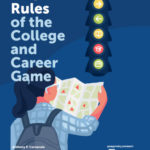Having a game plan is essential for making informed decisions about postsecondary education. Instead of leaving their financial independence to chance, potential students should take into account some basic rules offered by the Georgetown Center on Education and the Workforce.
The Georgetown Center released a new video this week with five rules for anyone who is considering an all-important postsecondary certificate. The animated short comes from the center’s report released in May, which detailed the necessity of making informed choices about schools and majors. Following their rules will not only save students money on their investment but also could result in higher lifetime earnings.
The video’s narrator says “what you take is what you make” and that phrase should be a mantra for all students who want to turn their major into a lucrative career. Students with this knowledge can avoid the trap of student debt and mismatched skills Georgetown Center Director and study co-author Dr. Anthony Carnevale says in a blog post for LinkedIn.
“While no student should choose a major based purely on earning potential, all students should know what the payoff is likely to be before making the first major investment in their journey from youth dependency to adult independence,” Dr. Carnevale says.
Despite more transparency about soaring higher education costs and student outcomes, many students are of the belief that having a degree is enough to earn a decent living. A recent survey of 4,900 Rutgers University students indicates that many did not consider their future earnings when choosing their major despite having information about outcomes. The Georgetown Center report says they aren’t misguided, just misinformed about their overall earning potential.
The conventional wisdom about the value of a college degree still holds water. Graduates with a bachelor’s degree are better off financially than people with only a high school diploma, earning an average of $26,000 more a year. Those with graduate degrees earn a median salary of $80,000, according to the Georgetown Center’s research, leading to the first rule: More education is usually better.
When factoring the cost of higher education, however, racking up degrees can leave students with a higher debt obligation that their field of study may not provide. Borrowers have an average of $37,000 in debt after graduation. The Georgetown Center says that 11.5 percent of them default on their loans. Or graduates are stuck in burdensome repayment plans that prevent them from placing a down payment for a home or car.
That is why the Georgetown Center says students should take more consideration about their choice of major in their second rule: Majors matter more. Highly technical fields like engineering and architecture command bigger salaries compared to education majors. Though there is a high demand for engineers and educators, the private sector is more likely to offer better wages to attract more talent than state governments.
However, a liberal arts major isn’t constrained to a lifetime of meager earnings. The third rule affirms this: Majors are important, but they do not control one’s destiny. Their findings show that the top 25 percent of liberal arts majors make around $21,000 more than the bottom 25 percent of architecture and engineering graduates. So it’s not just what students choose to major in, it’s how they apply it to the working world.
RELATED STORY: Art Bilger – Upskill now to access millions of jobs
Rule four is something that WorkingNation has consistently promoted in our coverage of the myriad higher education pathways available to students: Less education can be worth more. The Georgetown Center says that 28 percent of STEM-trained one-year certificate or associate’s degree holders out earn humanities majors with bachelor’s degrees. Some bachelor’s degrees have more earning potential than a graduate degree.

With more states opting to make two-year colleges and technical schools more affordable through College Promise programs, the value of short-term certificates increases. The demand for skilled aviation mechanics, auto mechanics and insurance claims processors resulted in public-private solutions at the community college level to solve their industry’s particular skills gap. A more informed decision process by students can lead them to careers without accumulating student debt and leave them with an option to further their education.
Ultimately, students must consider rule five when choosing between a humanities or liberal arts degree and a STEM-focused one: Earning gaps persist across career paths. According to the Georgetown Center, humanities and liberal arts bachelor’s degree holders max out at $66,000 a year. The ceiling for STEM majors, such as engineering and architecture, can hit six figures.
No matter what, the Georgetown Center rules reinforce their earlier research that said that by 2020 at least 65 percent of American jobs will require at least some postsecondary education. The precipitous decline of the value of a high school diploma since the 1980s doesn’t mean that good jobs are not available to those without bachelor’s degrees.
With more than 30 million good jobs out there for the taking, obtaining a postsecondary degree is a foregone conclusion. The five rules exist to provide students and their families with a game plan for making their next critical life decision.

To read the Georgetown Center’s full report, Five Rules of the College and Career Game, click here. They also have a handy online tool for determining the average earnings of undergraduate majors.
Join the Conversation: Would you go back and change your choice of college major if you had more information about outcomes? Tell us why on our Facebook page.
© Copyright 2024 by Structural Unemployment, LLC dba WorkingNation